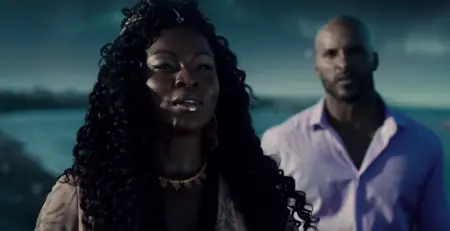Neil Gaiman's acclaimed novel American Gods had a rough time making it to the screen. First published in 2001, it wasn't until the spring of 2017 that a television adaptation finally hit the airwaves. Created by Bryan Fuller and Michael Green (Hannibal, Stark Trek: Discovery), upon its debut, the Starz series perfectly grasped Gaiman's blend of meditative social commentary and fantasy action. It sported a slower pace than other literary adaptations (Game Of Thrones, or The Handmaid's Tale, for instance), but overall critics enjoyed its "prestige television" quality, celebrating it as a series both visually, narratively, and symbolically rich.
It also took numerous departures from the source material, some to reflect the societal and technological changes that occurred in the sixteen year gap between the novel and series, others to expand and enhance minor characters from the novel to make the cast and narrative more diverse—in particular, Laura Moon (Emily Browning), the "dead wife" of protagonist Shadow (Ricky Whittle), who exists mostly in the background in Gaiman's book, and the love goddess Bilquis (Yatide Badaki), who dies early in the novel, but sticks around in the series and plays a key role in the overall plot.
And yet, despite solid critical appraisal and viewership, the show ran into trouble by the end of its first season. Budgetary disputes between Fuller and Green, the production company Freemantle, and Starz became toxic, and the creators bowed out, taking with them cast members Gillian Anderson, who portrayed the godly incarnation of Media, and Kristen Chenowith, who played Ostara, the Pagan deity and progenitor of the Christian holiday Easter. Fuller and Green were replaced by Jesse Alexander, who previously worked with Fuller on Hannibal, Heroes, as well as, on his own, Lost, with rumors that Gaiman himself would come on board as co-showrunner (those rumors were eventually squashed, as Gaiman elected to take the same job for a different show, the Amazon Prime adaptation of his and Terry Pratchett's novel Good Omens).
But then, quickly into production of season two, Alexander was also pushed out, with most reports indicating he had a vastly different vision from Freemantle, Starz, the cast members, and Gaiman, all of whom wanted to preserve, as much as possible, Fuller and Green's original vision of the series. All things considered, it took roughly two years for the series to return for its second season.
Based on all the chaos behind the scenes, that a season two even exists is a miracle. But finishing the job and producing another eight episodes, while certainly an accomplishment, doesn't necessarily guarantee a retention of the first season's quality. Now that we're over halfway through this new string of episodes, it's a good time to check in and see if the creative minds involved managed to pull off the seemingly impossible, or if American Gods, at least in this incarnation, was far too damaged by its internal strife and just couldn't get back on course. Has the series steered back toward Gaiman's novel, or has it veered too far into its own expanded plot? Finally, given all these considerations, what might the future hold for this troubled TV show?
The Season Two Premiere and Beyond
The series essentially picked up right where it left off in season one, though a few tweaks had to be made to accommodate Kristen Chenowith's absence. In the season one finale, Ostara, emboldened by Mr. Wednesday's (Ian McShane) flattery (read: trickery), asserts her long-dormant godly powers and repossesses the blooming springtime growth, a rebirth of nature she will continue to withhold until those who have co-opted her holiday (Christians with their infinite iterations of Jesus) express their devotion to the O.G. (Original God).
Given Chenowith's departure, this plot point receives only brief acknowledgment in the season two premiere, with Mr. Nancy AKA the trickster god Anansi (Orlando Jones) informing Wednesday that Ostara will no longer be joining in his war against the New Gods, given that he willingly ran over some of her pet bunnies on his way to her Kentucky estate. From there, the characters move on to Wisconsin and the rendezvous at House on the Rock, a pivotal and iconic scene from Gaiman's novel, adapted almost verbatim for the screen.
It seemed, at this point, the series might be poised to follow the source material more closely. But as soon as literary devotees felt comfortable in this familiar trajectory, the action branched off once again into its own territory, most notably with the death of Zorya (Cloris Leachman), which galvanizes the Old Gods into accepting Wednesday's bid for war. Laura and the leprechaun Mad Sweeney (Pablo Schreiber) continue on with their side adventure to restore the dead wife to her former glorious self, and Salim and the Jinn Ifrit continue their complicated romance, two subplots found nowhere in Gaiman's book (especially for Sweeney, who at this point in the author's original narrative, is quite dead).
Another deviation from the book: Media has gone into hiding after the embarrassing battle at Ostara's estate, though we later learn she wasn't so much hiding as cocooning, the end result being her metamorphosis into New Media (Kahyun Kim), a younger incarnation of the original deity deriving her power from YouTube and social media. While this change was a practical one, given that original actress Gillian Anderson left the series with Fuller and Green, it actually works in the show's favor, since indeed media as we know it has changed quite a bit even from the series 2017 debut. Reworking the character here as a petulant child who, alongside Tech Boy (Bruce Langley), better represents the insouciance and impatience of the New Gods, as well as the fickle and ever-transformative nature of their worship. They, just like the Old Gods, must forever stay on top of shifting tides in their devotees, or else face obsoletion. Establishing the similarities between the Old and New Gods is an important step for plot points to come (hint for anyone who's never read the novel: it has everything to do with Mr. World, played in the series by Crispin Glover), and it's a smart move on the part of the series' writers to include this element earlier rather than later.
So it's clear season two continues blending elements from Gaiman's novel and new plots/characters created especially from the series. But does it still work as well as it did in season one? Other reviewers believe the answer is no, that overall the series has taken a turn for the worse, calling it clunky, rambling/pat, and, perhaps most damning of all, a "pit of wasted potential." Personally speaking, I disagree with these criticisms (though I do have problems with season two). Bryan Fuller's shoes are incredibly hard to fill (he makes some of the headiest television you'll ever watch), but everyone involved has done an amazing job holding on to the groundwork Fuller and Green laid out. Although the pacing has quickened some, the series continues to take its time with meatier character development, particularly via flashbacks (we get our first real glimpse of Shadow's adolescence, something missing from the novel, which helps us better understand his complicated relationship with faith and, generally, what makes him tick). And while the ideas aren't quite as dense and complex as in season one, the writing is still sharp, and the cast is at the top of their game; of particular note on these two points are the last two episodes aired, "The Greatest Story Ever Told" and "The Ways of the Dead," which tackle race relations and Black Lives Matter head on, and are great showcases for Bilquis, Anansi, and Ibis (Demore Barnes), and the other characters of color.
The biggest issue with this new season, however, isn't one many other reviewers seem to be talking about: the significantly-reduced importance of the series's female characters—ironic, given that all of them were beefed up by Fuller, Green, and Gaiman from their literary counterparts in the first place to give the series better female representation. While the transformation of Media to New Media, all things considered, was a good move, the character lacks the personal motivations and agenda established by her predecessor, seemingly willing to play subservient lackey to Mr. World and taunt Tech Boy. Laura, too, hasn't evolved much past her basic desire to save Shadow and assuage her guilt at "betraying" him years ago, transforming from a take-charge badass to a submissive figure who more or less does what she's told (and in the latest episode from Sunday, April 7th, the writers now seem to be tacking on a romantic subplot between Laura and Sweeney, destroying their buddy comedy/frenemy vibe).

Worse still is Bilquis, who could be out there playing both sides of the war between the Gods, advocating for change and reformation while also acknowledging her roots, but instead just floats around the funeral home in Cairo, pursuing the devotion of a single mourner there (Mouna Traoré), rather than setting her sights on the entire town's black population, who feel disenfranchised and hopeless (if the series is leading to this, it's taking a bit too long to get there). Worst of all, however, is Bast, who has only appeared once in her human form (played by Sana Asad), and while it demonstrates her powers of sexual healing, the portrayal is decidedly one dimensional, i.e., strictly sexual; on top of this, other characters speak of her as though she is merely the pet cat of Ibis and Anubis, rather than an autonomous and formidable goddess with a backstory. Again, possibly the creators are building to all of this, but it's taking too long, and it's no fun seeing the formerly fleshed-out and active female characters sidelined so considerably. One hopes the writers and incoming showrunner Chuck "Chic" Eglee (more on him in a moment) will retain what's working with the show now but also revitalize the women in the series.
But will this actually happen?
Only time will tell here. It doesn't seem likely the series will take a huge nosedive in its final three episodes (though it's not impossible). Starz has officially renewed the series for a third season (the plan was always to produce at least five seasons total), and they've hired a new showrunner, the aforementioned Eglee, who worked previously on the early seasons of Dexter (promising), The Walking Dead (either promising or disheartening, depending on your views of that AMC stalwart), and Hemlock Grove (most likely universally disheartening). But Gaiman's excited about Eglee, and it also seems likely the author will continue to closely oversee things behind-the-scenes. If things continue on positively, the future of the series just might be secure. However, it should be noted that Starz isn't opposed to pulling the plug on shows early, even when things are going well (see Ash Vs. Evil Dead), and the series's current issues with its women characters might never get addressed at all—or get even worse—which would be a huge detriment and a deal-breaker for me.
We'll just have to wait and see.

About the author
Christopher Shultz writes plays and fiction. His works have appeared at The Inkwell Theatre's Playwrights' Night, and in Pseudopod, Unnerving Magazine, Apex Magazine, freeze frame flash fiction and Grievous Angel, among other places. He has also contributed columns on books and film at LitReactor, The Cinematropolis, and Tor.com. Christopher currently lives in Oklahoma City. More info at christophershultz.com









